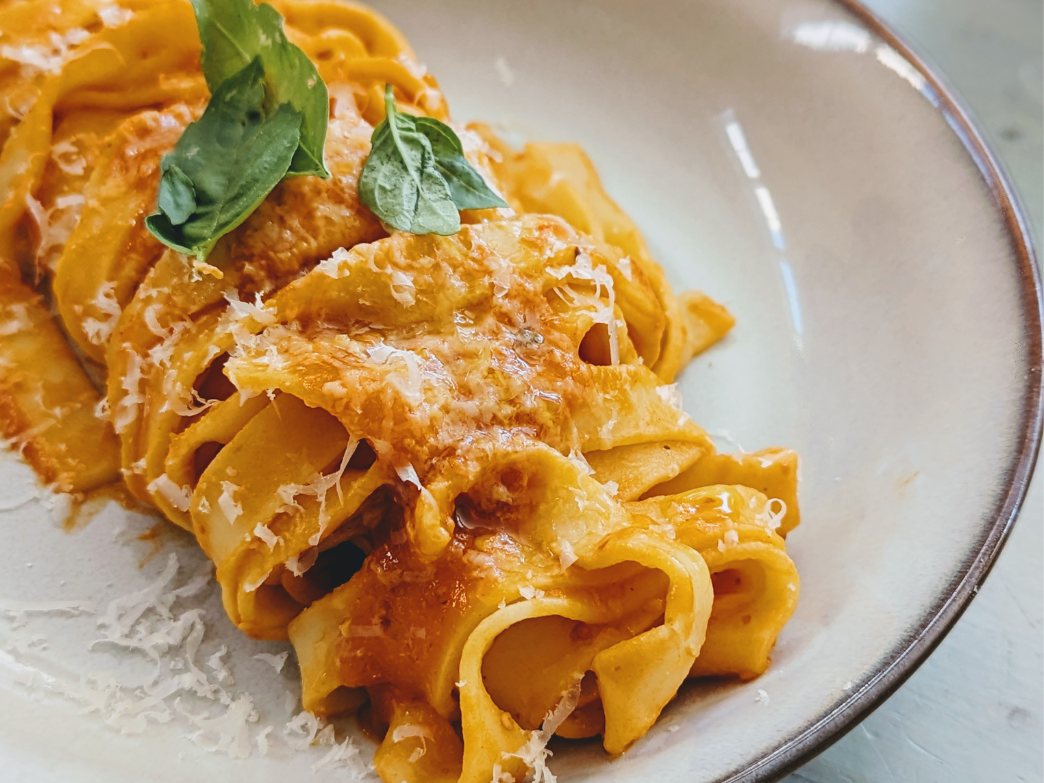By Lucy Yanckello, Ph.D.
Fries and pasta: two of the most popular carbohydrates. Both are loved by all. They’re also sometimes avoided when trying to lose weight - but do they need to be? Read on to learn more about the nutrients found in each, and how they compare.
Can you eat fries with pasta? Is fries with pasta popular?
The most important factor when deciding what to eat, is a balance between protein, carbohydrates, and fat. Both fries and pasta are carbohydrate-dense foods. If you want to eat both fries and pasta at a meal, be sure to include a protein source, such as meatballs, with your pasta, and add in some extra fiber-filled veggies with your fries.
Are fries healthy or unhealthy?
Although potatoes have a good amount of fiber and other vitamins and minerals, frying them increases saturated fat, which increases the risk of cardiovascular disease. The addition of salt does not do any favors either, and can cause increased blood pressure. Although deep fried French fries may not be the way to eat potatoes on a daily basis, any food can find its place in a healthy diet in moderation.
Are fries or pasta healthier?
Due to the fat content in fries, it seems likely that pasta would be the healthier choice because it has a higher protein content, which is known to keep you fuller for longer between meals. However, a recent study by the Journal of the American College of Nutrition investigated whether a side of potatoes or a pasta dish would be more satiating. Interestingly, participants had a lower desire to eat again after consuming a side of French fries with their meal compared to any of the other carbohydrates.
No matter the results of this study, it is important to remember that fries have a high content of saturated fat and salt. These nutrients can lead to high blood pressure and put individuals at risk for cardiovascular disease. So, although fries may have gotten the green light in terms of satiety — remember to consume in moderation.
Which has more carbs: pasta or fries? Which has more calories: pasta or fries?
Per a 100 gram serving of pasta there is 74 grams of total carbs, whereas fries have 41 grams of carbs per 100 gram serving. This means that pasta has 80% more carbohydrates than fries. However, both are considered to be high in carbohydrate content. Their calories contents are similar with pasta coming in at 371 calories per 100 grams and fries with 312 calories per 100 grams.
Are fries or pasta better for weight loss? Can you eat fries and still lose weight?
Both pasta and fries can be part of a healthy diet for those trying to lose weight. It is important that when cutting calories you still eat foods that you love. Cutting out certain foods or food groups all together will just make you crave them more.
Pasta has a higher protein content, which can help with weight loss. It is vital to eat the proper amount of protein in order to lose weight. Although it would seem that fries would not keep you full because they have lower fiber and protein content, but high fat and carbohydrate content, the recent study discussed above has proven differently. If fries leave you feeling satiated they may aid in helping you lose weight, as being satiated is an important way to keep from snacking and binging foods.
Where can I buy the best fresh pasta online?
At Wildgrain, we specialize in making high-quality, fresh pastas and breads that are delivered directly to your door. Wildgrain is the first bake-from-frozen delivery subscription service for breads, pastries, and fresh pastas. Some of our popular pastas include fresh fettuccine and fresh tonnarelli. Learn more about Wildgrain and our artisanal baking and cooking methods.
About the Author
Lucy Yanckello received her Ph.D. in nutrition from the University of Kentucky College of Medicine. She currently works as a medical writer and enjoys being able to help people better understand nutrition and science.
This content is for informational use only and does not replace professional nutrition and/or medical advice, diagnosis or treatment. It is not a substitute for and should not be relied upon for specific nutrition and/or medical recommendations. Please talk with your doctor about any questions or concerns.



